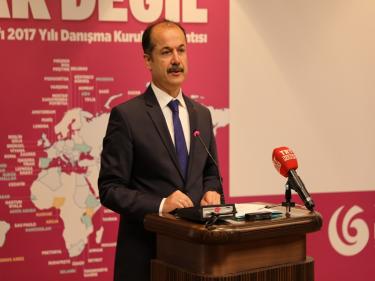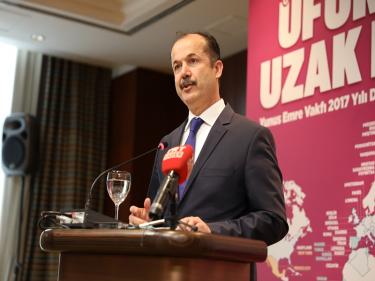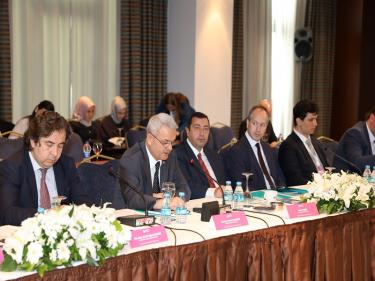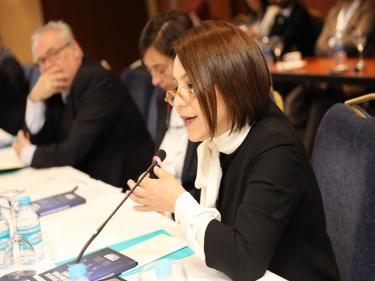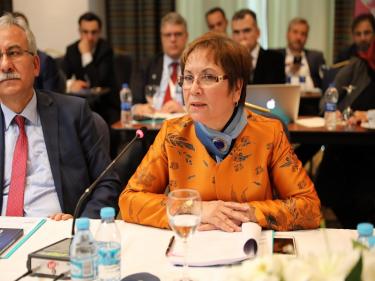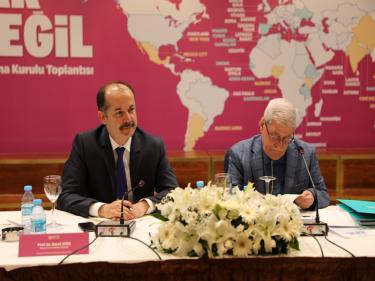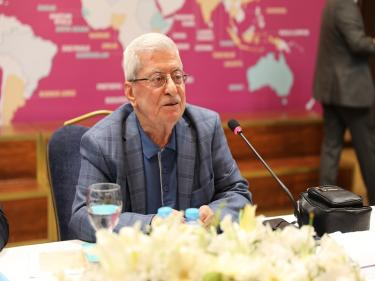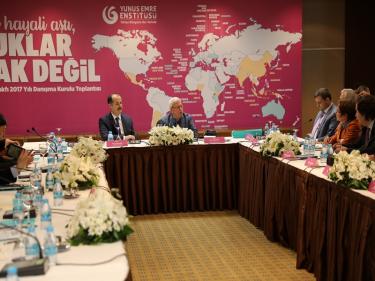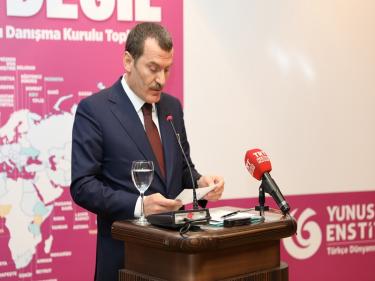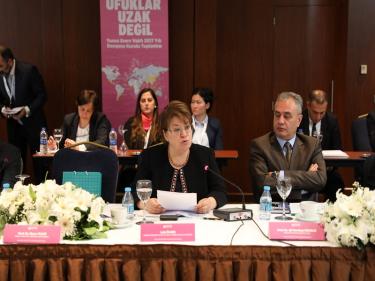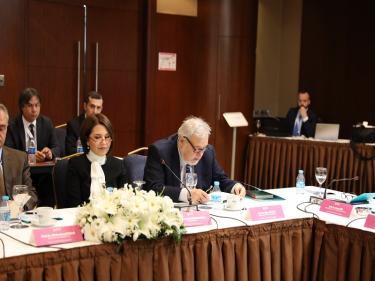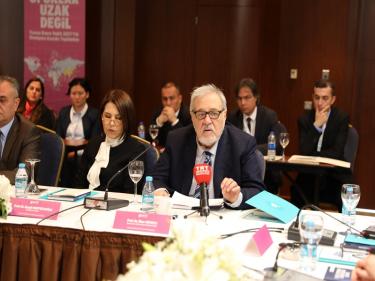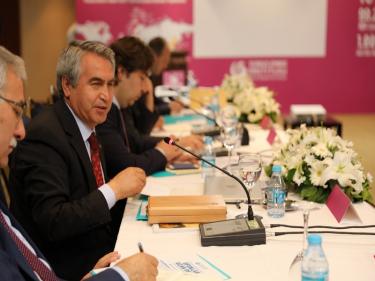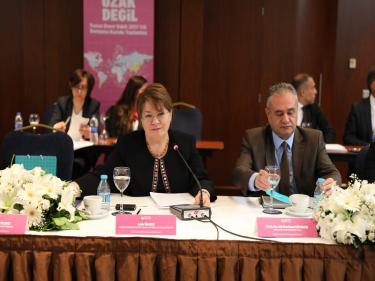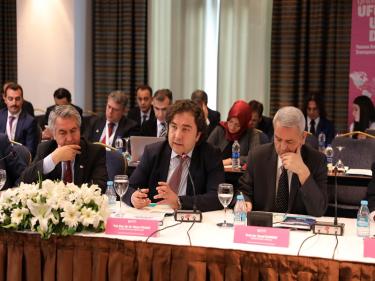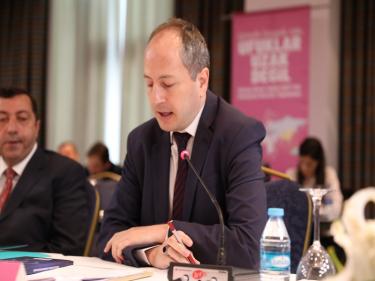New Goals from YEF
“Reality Exceeds Dreams, Horizons are not Far!”
Yunus Emre Foundation 2017 Advisory Board Meeting was held in Ankara. In the meeting where a large number of academicians and bureaucrats gathered, the role of Yunus Emre Enstitüsü, established by the Foundation, in cultural diplomacy was underlined. Yunus Emre Enstitüsü President Prof. Dr. Ateş said, "Our activities, launched in sister regions, have reached five continents in seven years, and we feel the pride of exceeding our dreams.”
Yunus Emre Foundation, that has carried out operations with 50 cultural centres in 40 countries for 7 years with the mission of introducing Turkish culture and language to the whole world, held 2017 Advisory Board Meeting at Ankara Sheraton Hotel on Tuesday, May 23rd. The slogan of the meeting where the activities carried out in 2016 and the goals for year 2017 were discussed, was "Reality exceeds dreams, horizons are not far!", the first line of a poem by late Mehmet Çınarlı.
"We extended to the World from Sister Regions”
Yunus Emre Enstitüsü President Prof. Dr. Ateş stated that the primary mission of Yunus Emre Foundation is for Turkey to attain a positive image through language, culture and various projects, and to establish connection between other nations and Turkish society and Turkey. Prof. Ateş continued as follows: "Yunus Emre Enstitüsü having reached five continents of the world in 7 years, is our shared pride and joy. In the early years of Enstitü, we prioritized nearby regions, and tried to be active in the Balkans and Turkic world. In the second stage, we prioritized extending to European countries, and in the third stage, we increased the number of our centres in certain regions and countries of the world. Merely opening a centre does not suffice, these centres must also operate actively. In this sense, we have organized and still organize an event each day in Yunus Emre Enstitüsü centres in some corner of the world. Within the past year, we carried out 1200 activities. In addition, we doubled the number of face-to-face Turkish instruction provided. Moreover, since there are numerous regions we still have not reached, we have had the opportunity to reach tens of thousands of people through Distance Turkish Instruction project."
"Cultural Diplomacy is a Social Issue"
Turkish Ministry of Culture and Tourism Undersecretary Ömer Arısoy stated that Yunus Emre Enstitüsü has carried out a number of studies to duly promote Turkish culture and language all over the world in the last decade, and said, "We all have great responsibility to bring our local and national culture to the fore, and allow it to take the place it deserves in the international arena. You cannot build a wall only out of stone. The cultural diplomacy cannot achieve the desired level through activities of a single institution. Effective use of Turkish cultural diplomacy towards common goals should be ensured through coordination of civil society in short and medium terms. I believe that Yunus Emre Enstitüsü, aspiring to perform its duty well by maintaining a supra-political position since its establishment, will succeed in this matter as well. "
FIRST SESSION: ISLAMOPHOBIA
In the first session of the meeting, the policies to be followed by Yunus Emre Enstitüsü and strategies to be implemented in the face of rising racism and Islamophobia in the Western world, were discussed. Lale Ülker, Turkish Ministry of Foreign Affairs General Director of Promotion and Cultural Affairs Abroad and member of Yunus Emre Enstitüsü Board of Directors, who moderated the session, stated that soft power that is cultural diplomacy is needed in eliminating the threats and tests in question.
Lale Ülker said, "The careful assessment of collaboration opportunities in cultural area and Turkey's image which shapes the cultural environment of any country, are of importance for implementation of culture policies abroad."
İlber Ortaylı: Not All Institutions are Qualified to act as Cultural Envoys!
Session's moderator Lale Ülker called upon Galatasaray University Faculty Member Prof. İlber Ortaylı to speak. Prof. Dr. İlber Ortaylı underlined that Yunus Emre Enstitüsü undertakes a major task, and said, "Yunus Emre Enstitüsü centres cannot be substituted with other institutions. We also need TİKA, the Ministry of Development; we will need the Ministry of Diaspora if it is established, but Yunus Emre Enstitüsü is something else. No organization can replace Goethe or Cervantes Institutes. And they do not. Everyone should accept that this is also the case with our Yunus Emre Enstitüsü. No other institution can perform the tasks in Yunus Emre Enstitüsü's fields of operation. We do not aim to go beyond that anyway. We will pay attention for these are the most important elements."
Öcal Oğuz: "Come and Let's Meet" should be emphasized
Speaking after Ortaylı, UNESCO Head of Turkish National Commission Öcal Oğuz stated that Yunus Emre's lines "Come and Let's Meet" and "Love and Be Loved" must be strongly emphasized.
Marking that as an unbiased party, UNESCO will contribute to the efforts of Yunus Emre Enstitüsü in neutralizing the negative image, racism and anti-Islamism, Oğuz spoke as follows: "Since all decisions taken in UNESCO are by conciliation and consensus of the international community, it is possible to create an opportunity to defer and eliminate institutions that are Islamophobic and likely to create arguments against us, by setting off from these references and sources. These can be utilized as arguments and instruments.”
Ali Merthan Dündar Stressed Collaboration
Ankara University Faculty Member Prof. Dr. Ali Merthan Dündar stated that employing Ankara TÖMER lecturers would also be beneficial in terms of experience. Dindar said, "It is important to include Turkish in publication languages of academic magazines published in university and academies in country and regions where Yunus Emre Enstitüsü has influence. Collaborations can be established with YTB and TİKA”, and also stated that Enstitü employees must certainly be selected from locals next to staff assigned from Turkey, and language orientation for these individuals should begin one year in advance.
M. Yalçın Yılmaz: Must be told to the world in Yunus Emre's language
Istanbul University Faculty Member and Yunus Emre Enstitüsü Board Member Ass. Prof. M. Yalçın YILMAZ said that the works of Yunus Emre, Enstitü is named after, should be translated into foreign languages, both racism and anti-Islamism rising all over the world after 2000s can be explained to the world again through Yunus' language and exposition, and translate Yunus Emre'a works into various languages would be beneficial.
Yusuf Sarınay: Projects should be devised by intellectuals and journalists
TOBB ETU Vice Rector Prof. Dr. Yusuf Sarınay marked that Yunus Emre Enstitüsü should introduce the values of Turkish nation to the world by support of partner institutions and said, "Yunus Emre Enstitüsü must devise projects in the presence of local science-art institutions, intellectuals, journalists, and enable establishing one-to-one relationships.”
Kaan Sidar Promised Support on behalf of the Private Sector
Secretary General of the Food Sector Employers' Union Kaan Sidar stated that Yunus Emre Enstitüsü has achieved great success in a short period of time, and expressed that they are ready to offer the necessary support as the private sector.
Murat Kazancı underlined the collaborations between YEE and YTB
Head of YTB International Students Department Murat Kazancı addressed the collaborations between the two institutions, and informed the members of the Advisory Board that the collaboration is maintained getting stronger, through examples. Kazancı said, "Turcology departments abroad should be made more attractive, and as YTB we are ready to play our part in this. We will cover the preparatory class expenses of these students, if legislations can be met. Our universities have opened Turkish language instruction programs for foreigners. We think this will contribute to YEE and its activities if we make them more attractive. "
The first session ended after session's moderator Lale Ülker summarized the meeting.
SECOND SESSION: CULTURAL DIPLOMACY ACADEMY
The second and private session of the seminar took start with the promotional video of Yunus Emre Enstitüsü Cultural Diplomacy Academy, established in 2016 to raise Turkey's cultural diplomats and to determine Turkey's impact-oriented cultural diplomacy policies. The session was held to discuss the recommendations and instructions to identify Academy's field of activity in the context of The Third National Cultural Council Final Reports.
Prof. Dr. Yusuf Sarınay who moderated the second session, spoke as follows: "The institute that has rapidly grown by reaching 50 centres in 5 continents in 8 years, and aims to have opened 100 centres by 2023, the 100th anniversary of Turkish republic, has represented our cultural diplomacy and language all over the world. It has carried out major activities in a short time.”
Serpil Murtezaoğlu: Cliches must be avoided
İTÜ Faculty Member Prof. Dr. Serpil Murtezaoğlu, marking that culture must be readdressed, spoke as follows: “Cultural Diplomacy Academy is important since it allows you to display your view. It is important to offer a perspective on the vision to follow. This must be circulated around in various segments of the society apart from Enstitü employees. Cliches must be avoided by placing emphasis on creative industries, design and production.”
Hilal Bereket: We worked with YEE
Head of the Ministry of National Education Monitoring and Evaluation Office Hilal Bereket stated that the teachers, assigned to European countries to give Turkish lessons after July 15th face difficulties, and said, "We send education counsellors and attaches, and they work with Yunus Emre Enstitüsü. Some oral and written applications from universities reach our Ministry to submit to YEE. We previously collaborated for the Turkish Summer School."
Gürer Gülsevin: Third Generation Turks should be taught Turkish
Ege University Faculty Member Prof. Dr. Gürer Gülsevin stated that Yunus Emre Enstitüsü regards Central Asia and Africa as target regions. Gülsevin emphasized the importance of being successful in these regions for Western Europe, and said, "Our aim is to teach Turkish and Turkish culture to foreigners, but I think that our priority should be third generation Turks and that we should teach them their own language."
Metin Demir: Islam and terror cannot come side by side
TİSK Board of Directors member Metin Demir said, "It is pleasing to have achieved such success in 8 years. Our operations should be categorized under two main topics: Anti-Islamism and Turkish language. We need to show that Islam and terror cannot come side by side. Production, economics, culture, language, communication, interaction are interconnected, and we should communicate as a society. "
Ramazan Kaplan: YEE has Major Achievements Despite Campaigning
YEE Advisory Board Member Ramazan Kaplan, stressing that analysing countries is the key to success, marked that country specialists must be trained in cultural diplomacy, and spoke as follows: “YEE has major achievements in a short period of time; the chosen slogan is also very meaningful: Reality exceeds dreams... The plans for coming terms sign that the success will be doubled, and we will attain the goal '100 Enstitü centres by 2023'. The year 2016 was a critical year for Turkey; it had a lot of international repercussions. YEE was affected by this. Despite the campaigns against YEE, Enstitü carried out considerable activities. I would like to congratulate all YEE community."
Ended with Rasim Özdenören’s anecdotes
At the end of the Advisory Board Meeting where expert academicians, intellectuals and bureaucrats expressed their opinions about Yunus Emre Enstitüsü's future envision, the final declaration on issues discussed throughout the meeting was read, and a family photo was taken.
Yunus Emre Foundation Board of Trustees member Rasim Özdenören made the closing speech of the meeting, and reminding that people consider what they do not know as hostile, spoke as follows: "We see that those who do not know Turkey, Turkish language and culture, nurture enmity. It is not right to only blame the other party. How well do we know ourselves, and how much can we express them? Are we getting further from knowing ourselves? This is a generalization: We should not expect others to know us when we do not know ourselves... Our Yunus Emre Foundation and its affiliate Yunus Emre Enstitüsü, do their best despite of all these negativities, and have accomplished a lot to date, in a short period of time. There are clues that more can be achieved, however everything cannot be expected from Yunus Emre Enstitüsü. "
Enstitü further strengthens its activities by benefiting from the resolutions issued at the end of Advisory Committee Meeting, held every year.

